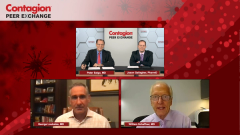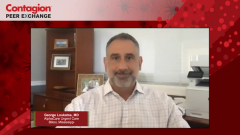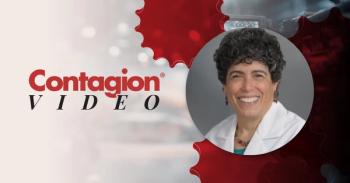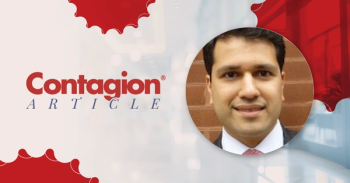
Encouraging the COVID-19 and Flu Vaccines
The concept of the “immunization neighborhood” highlighting the importance of pharmacists in encouraging and administering vaccinations.
Episodes in this series

Transcript:
Peter Salgo, MD: Let’s close this loop. We want to encourage the flu vaccine and COVID-19 vaccine. With all the information that’s been out there, people are getting overloaded. What’s the best way for clinicians, pharmacists—all of us at this point—to encourage people to get vaccinated? If this information hasn’t sunk in yet, do we have a chance, Bill?
William Schaffner, MD: We do have a chance, and we’re a team. For example, the role of pharmacists in providing information and immunization has been growing over the last decade or so. Every pharmacist in school now actually gets more elaborate training about vaccines and their delivery than we do in medical schools. That’s a fact. So we have incredible partners as part of what we’ve come to call the immunization neighborhood. And of course, information is part of that. We’re getting better at the state level in collaborating with each other. I’ve been a passionate advocate and supporter of pharmacists being part of the team and physicians recognizing the importance of pharmacists, as well as our nursing partners, physician assistants, and everybody else. This is a team effort.
Peter Salgo, MD: Jason, I mentioned before we had our discussion that the single greatest advance in my ICU [intensive care unit] was pharmacists, PharmDs, doing rounds with us. Out in the real world, people see pharmacists far more than they see doctors. They go to the drug store all the time. They interface with pharmacists. Pharmacists seem to me to be the natural leaders to encourage vaccination and all of the good practices we’d like.
Jason Gallagher, PharmD: I hope so. I say to our students all the time that the setting where pharmacists have to shine the most is in the community center. They see these semiglamorous—if you can say that—roles of infectious disease pharmacist and people in critical care and so forth, but the frontline practitioners are the ones in the community pharmacies. That has shined in the last year and a half, where pharmacies have delivered very high percentages of the COVID-19 vaccines. It’s gone beyond information providing and so forth. When patients are looking for sources of information, they’re going to go to people they trust. It’s not so important who that person is in the medical community, as long as they can find somebody.
Peter Salgo, MD: It’s important that you said, “In the medical community.” They’re not going to their congressmen and they’re not going to….
Jason Gallagher, PharmD: Facebook.
Peter Salgo, MD: Facebook, or some Facebook or YouTube video.
Jason Gallagher, PharmD: But often they are, and then they can turn and go to Bob the pharmacist and ask, “Bob, have you seen this video?” He can say, “Yes, I have. But what it doesn’t say is that the mRNA vaccines, while they were only studied in this past year for patients, have been in development for 15 years,” and things like that. I love the term immunization neighborhood because it shows that anyone in that neighborhood can be that source of information.
Peter Salgo, MD: What you’re describing, both for clinicians on the MD and DO side and the pharmacy side, sounds a bit reactive to me. Somebody has to come in. Somebody has to talk to that pharmacist. What about outreach? We’re all quick to bash social media, YouTube, and bloggers. Shouldn’t we be out there reaching forward proactively?
Jason Gallagher, PharmD: Yes, that’s a plus if it can be done. It’s interesting hearing you say that. I was listening to a podcast a couple of weeks ago. I don’t want to get into politics here, but a conservative blogger was speaking to a liberal blogger. The conservative guy was saying, “I think that pharmacies should be reaching out to their patients. They’re seeing these patients so frequently that this is an opportunity to reach out and encourage immunization.” I honestly hadn’t thought about that particular angle before. There’s always that balance of how aggressive someone is in advocacy. You can see it turned in the wrong way rather easily. But it’s important. The more facing forward practitioners doing it, the better.
Peter Salgo, MD: We need to reach out. If there’s a message that we believe is scientifically important and important to the public health, shouldn’t we be out there? Shouldn’t there be blogs from all of us? Shouldn’t there be YouTube videos from all of us saying what looks like the correct scientific approach here, George?
George Loukatos, MD: Yes. As an emergency [department] physician now having transitioned to the outpatient world, even as a clinician in general, I was always focused on keeping myself up to date for my patients on whatever particular type of case I was handling. Over the last year and a half, that has transitioned into where I feel like I’m becoming more of an expert in public health issues and doing a lot more outreach to educate my community. We do a Gulf Coast Moms blog and informational sessions to try to get the correct information out there, because there’s so much incorrect information out there.
The other point I wanted to add to what you guys have said is that when we talk about what we can do, we need to first look internally to our own community, the medical community, to encourage our colleagues and come up with avenues to make it easy for people to stay up to date. Because one thing that the COVID-19 pandemic has taught us is that things are changing constantly, and it’s very important to stay up to date on the latest recommendations. A lot of the guys who have been practicing for years and doing the things they do haven’t been great about doing that. In some instances, they’re the ones propagating misinformation to their patients. We’ve got to support our own community and make it known and essential that we need to stay up to date. How do we make that easier for the guy who’s just punching the clock 9 to 5 in the family practice clinic?
Peter Salgo, MD: What do you think of this? To some degree, we’ve all been victims of our own success. With the antibiotic revolution, a whole generation of doctors came along who didn’t regard infectious diseases as that big of a problem anymore. You come in, we’ll give you some antibiotics, you go away, we’re good. But in fact, infectious diseases have a way of biting us, whether it was in my early career with AIDS, or things like swine flu, MERS [Middle East Respiratory Syndrome], and this pandemic. It comes back to bite you. It emphasizes something that my professors always taught me: the community is important. You can’t just sit in your office and do your examinations. You’re responsible for the community. How do we get that message out to our colleagues? You’re smiling, Bill.
William Schaffner, MD: The infectious diseases impress that upon them. There’s no practicing doctor who doesn’t realize that what happens in their office has implications for what’s going on in the community, and what happens in the community has implications for what’s coming through the front door of their offices. If influenza doesn’t do it, COVID-19 certainly has nailed that concept home. There’s been more communication between public health and practicing doctors than there has been in a long time.
Peter Salgo, MD: I want to thank you for watching this ContagionLive® Peer Exchange. If you enjoyed the content, please subscribe to our e-newsletters to receive upcoming Peer Exchange segments and other great content right in your inbox.
Transcript edited for clarity.
Newsletter
Stay ahead of emerging infectious disease threats with expert insights and breaking research. Subscribe now to get updates delivered straight to your inbox.


































































































































